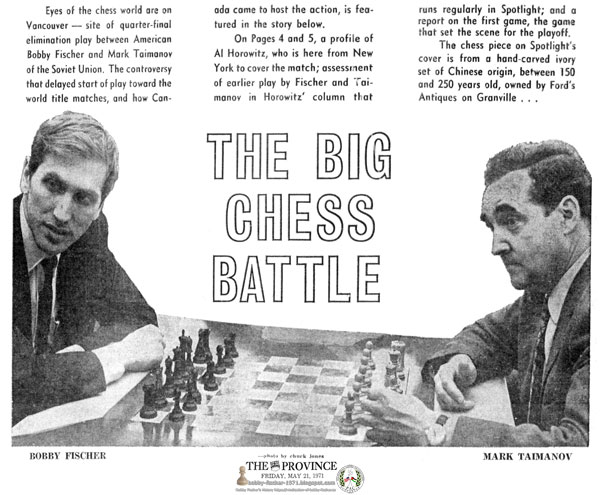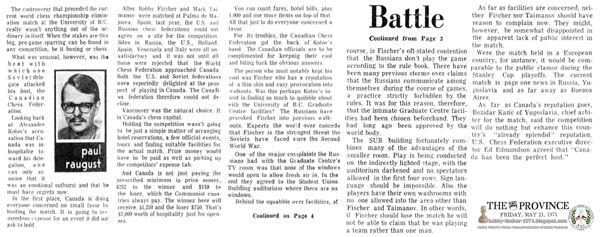The Province Vancouver, British Columbia, Canada Friday, May 21, 1971 - Page 45-46 ★
The Big Chess Battle
Eyes of the chess world are on Vancouver — site of quarter-final elimination play between American Bobby Fischer and Mark Taimanov of the Soviet Union. The controversy that delayed start of play toward the world title matches, and how Canada came to host the action, is featured in the story below.
On Pages 4 and 5, a profile of Al Horowitz, who is here from New York to cover the match; assessment of early play by Fischer and Taimanov in Horowitz's column that runs regularly in Spotlight; and a report on the first game, the game that set the scene for the playoff.
The chess piece on Spotlight's cover is from a hand-carved ivory set of Chinese origin, between 150 and 250 years old, owned by Ford's Antiques on Granville …
The controversy that preceded the current world chess championship elimination match at the University of B.C. really wasn't anything out of the ordinary in itself. When the stakes are this big, pre-game sparring can be found in any competition, be it boxing or chess.
What was unusual, however, was the heat with which one Soviet delegate attacked his host, the Canadian Chess Federation.
Looking back at Alexander Kotov's accusation that Canada was inhospitable toward his delegation, one can only assume that it was an emotional outburst and that he must have regrets now.
In the first place, Canada is doing everyone concerned no small favor by hosting the match. It is going to tremendous expense for an event it did not ask to hold.
After Bobby Fischer and Mark Taimanov were matched at Palma de Majorca, Spain, last year, the U.S. and Russian chess federations could not agree on a site for the competition. Sites in Russia, the U.S., Holland, Spain, Venezuela and Italy were all unsatisfactory and it was not until all these were rejected that the World Chess Federation approached Canada. Both the U.S. and Soviet federations were reportedly delighted at the prospect of playing in Canada. The Canadian federation therefore could not decline.
Vancouver was the natural choice. It is Canada's chess capital.
Holding the competition wasn't going to be just a simple matter of arranging hotel reservations, a few official events, tours and finding suitable facilities for the actual match. Prize money would have to be paid as well as picking up the competitors' expense tab.
And Canada is not just paying the prescribed minimum in prize money, $232 to the winner and $139 to the loser, which the Communist countries always pay. The winner here will receive $1,250 and the loser $750. That's $2,000 worth of hospitality just for openers.
You can count fares, hotel bills, plus 1,000 and one more items on top of that. All that just to do everyone concerned a favor.
For its troubles, the Canadian Chess Federation got the back of Kotov's hand. The Canadian officials are to be complimented for keeping their cool and biting back the obvious answers.
The person who most notably kept his cool was Fischer who has a reputation of a thin skin and easy provocation into walkouts. Was this perhaps Kotov's intent in finding so much to quibble about with the University of B.C. Graduate Centre facilities? The Russians have provoke Fischer into previous walkouts. Experts the world over concede that Fischer is the strongest threat the Soviets have faced since the Second World War.
On of the major complaints the Russians had with the Graduate Center's TV room was that none of the windows would open to allow fresh air in. In the end they agreed to the Student Union Building auditorium where there are no windows.
Behind the squabble over facilities, of course, is Fischer's oft-stated contention that the Russians don't play the game according to the rule book. There have been many previous storms over claims the Russians communicate among themselves during the course of games, a practice strictly forbidden by the rules. It was for this reason, therefore that the intimate Graduate Center facilities had been chosen beforehand. They had long ago been approved by the world body.
The SUB building fortunately combines many of the advantages of the smaller room. Play is being conducted on the indirectly lighted stage, with the auditorium darkened and no spectators allowed in the first four rows. Sign language should be impossible. Also the players have their own washrooms with no one allowed into the area other than Fischer and Taimanov. In other words, if Fischer should lose the match he will not be able to claim that he was playing a team rather than one man.
As far as facilities are concerned, neither Fischer or Taimanov should have reason to complain now. They might, however be somewhat disappointed in the apparent lack of public interest in the match.
Were the match held in a European country, for instance, it would be comparable to the public clamor during the Stanley Cup playoffs. The current match is page one news in Russia, Yugoslavia and as far away as Buenos Aires.
As far as Canada's reputation goes, Bozidar Kazic of Yugoslavia, chief arbiter for the match, said the competition will do nothing but enhance this country's “already splendid” reputation. U.S. Chess Federation executive director Ed Edmondson agreed that “Canada has been the perfect host.”
























